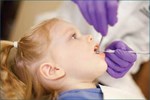
Making prevention work in practice: A course review
This report monitors the development of clinical knowledge and confidence levels in a group of dental nurses enrolled in the ‘Making Prevention Work in Practice’ training scheme

This report monitors the development of clinical knowledge and confidence levels in a group of dental nurses enrolled in the ‘Making Prevention Work in Practice’ training scheme


Dry mouth can lead to ongoing cavities, mouth infections and a number of other physical, social and emotional issues. The dental nurse is in an ideal position to help patients recognise dry mouth symptoms and help sufferers proactively manage their dry mouth condition

Ionisation legislation ensures a safe environment in which to work and receive treatment and requires that those involved in the radiographic process must be appropriately trained for the type of radiographic practice they perform. This article looks at ionising radiation legislation from the dental

Patients are often concerned about pain, bleeding and swelling after an implant has been fitted. Verbal and written instructions can help patients to minimise discomfort and problems after surgery and know now to identify an emergency

There have been many recent advances in the methods available for restoring endodontically treated teeth. This article provides a practical guide to the restoration of endodontically treated teeth based on the amount of sound tooth structure remaining


Dental nurses have a central role in implant placement, from explaining the stages of the process to patients and addressing patient concerns to assisting during the procedure itself and providing postoperative care and advice to maximise success rates

The aim of this paper is to discuss the dental management of patients who have received treatment for cancer of the head and neck. Following surgical and medical management of head and neck cancers, the postoperative care has an emphasis on maximising and maintaining quality of life

This article will describe the role of the dental nurse in taking personal, medical and dental histories. It will also emphasise the need for confidentiality and good records of this process, as well as the importance of the patient's first impression of the dental practice, or treatment clinic, bei

de Jongh A, van Wijk AJ, Horstman M (2013) Attitudes towards individuals with halitosis: an online cross sectional survey of the Dutch general population. Br Dent J215: E8

Diabetes is increasing, affecting millions of people in the UK alone. A significant number of patients attending the dental practice will have this condition, some as yet undiagnosed. Awareness of signs, symptoms and risk factors, including the impact on oral health, will help in the management of a

In 2013, Scotland's National Older People's Oral Health Improvement Group launched a guide to help care homes improve the oral health services they provide residents. Sheila Welsh explains why care homes in Scotland and the UK need to make this a priority

Lasers have great potential to improve treatment and are being increasingly used in dentistry. Patients, practice staff and visitors need to be protected from their potentially harmful effects on the skin and eyes, so dental staff need to understand and apply safety principles

There is a lack of awareness of the progressive auto-immune disease, multiple sclerosis. Symptoms occurring during a period of relapse may adversely affect both general and oral health and can make dental visits difficult. Knowledge of this disease will assist dental nurses in caring for patients wi